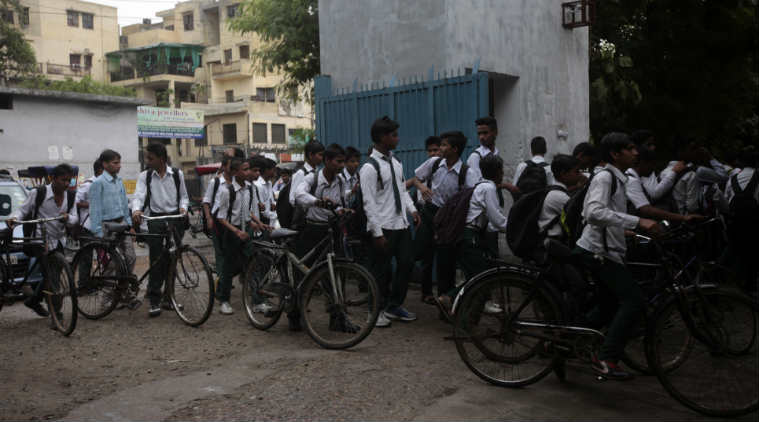Ritika Chopra, an award-winning journalist with over 17 years of experience, serves as the Chief of the National Bureau (Govt) and National Education Editor at The Indian Express in New Delhi. In her current role, she oversees the newspaper's coverage of government policies and education. Ritika closely tracks the Union Government, focusing on the politically sensitive Election Commission of India and the Education Ministry, and has authored investigative stories that have prompted government responses. Ritika joined The Indian Express in 2015. Previously, she was part of the political bureau at The Economic Times, India’s largest financial daily. Her journalism career began in Kolkata, her birthplace, with the Hindustan Times in 2006 as an intern, before moving to Delhi in 2007. Since then, she has been reporting from the capital on politics, education, social sectors, and the Election Commission of India. ... Read More
Centre’s plan: promotion to Class IX only if minimum standard met
The government has drafted an executive order to clarify that enrolment in Class IX can be conditional.
 The ‘no-fail’ policy of the RTE Act prohibits detention and expulsion of students until completion of elementary education, that is till completion of Class VIII.
The ‘no-fail’ policy of the RTE Act prohibits detention and expulsion of students until completion of elementary education, that is till completion of Class VIII.
Promotion to Class IX may soon become conditional in all schools as the Centre wants students to achieve some basic learning outcomes up to Class VIII.
The HRD ministry has sought Attorney General Mukul Rohatgi’s opinion on whether the government can issue orders under the Right to Education (RTE) Act 2010 to ensure students meet the Minimum Standards of Academic Performance (MSAP), prescribed by a school in all subjects from Class V to VIII, before being promoted to Class IX.
The ‘no-fail’ policy of the RTE Act prohibits detention and expulsion of students until completion of elementary education, that is till completion of Class VIII. Both private and government schools had interpreted this to mean compulsory promotion up to Class IX.
Now, six years after the law was enacted, the government has drafted an executive order to clarify that enrolment in Class IX can be conditional. The HRD ministry will issue orders to this effect once it has Rohatgi’s nod.
[related-post]
According to the ministry’s note sent to the Attorney General, a copy of which has been reviewed by The Sunday Express, the government has proposed that students should be assessed through Continuous Comprehensive Evaluation (CCE) from Class V to VIII and, at the end of each year, the school should award a certificate stating whether he/ she has attained the MSAP for the particular class.
No child, the note further states, will be detained for not meeting the MSAP and the backlog will be carried over to the next year till Class VIII. Such students will receive additional instructions from the teachers to cope with the backlog of learning.
However, promotion to Class IX will only be possible if the student has completed his/ her backlog of learning. It clarifies that absenteeism from class or absenteeism during the evaluation process shall also qualify as a child being unable to meet MSAP, and this shall clearly be mentioned in the certificate.
“It’s a little like voting. Everyone has the right to vote in this country, but only after you’ve turned 18 years old. Similarly, a student will have the right to enrol into secondary education, but provided he/ she can demonstrate some basic learning,” said a senior ministry official on condition of anonymity.
The proposed step, government sources said, was prompted by the criticism of the no-detention policy (Section 16) under the RTE Act, which prohibits all schools from failing and expelling a student up to Class VIII.
The rationale behind this policy is that compelling a child to repeat a class is demotivating and discouraging, often forcing him or her to abandon school/ learning altogether. Similarly, the notion of “expulsion” is not compatible with the concept of “right”. Hence, the Act, in order to make elementary education a “right”, prohibits failing and expulsion of all students till completion of Class VIII.
As many as 13 state governments want this policy to be scrapped on the ground that it is contributing to a sharp decline in the quality of the students at the elementary level. Since promotion is guaranteed, schools claim students don’t take classroom learning seriously and are enrolled into secondary level without having learnt enough in elementary school. This, they claim, leads to mass student failures in Class IX when they face the first serious examination.
HRD Minister Smriti Irani is learnt to have proposed the minimum eligibility for promotion to Class IX to resolve issues with the ‘no-fail’ policy, without having to amend the Act.
On being asked if the draft order still violates the RTE Act as it would amount to holding a child back in Class VIII, a senior official argued that this is legally tenable as the government, technically, is allowing students to complete elementary education. “But the right to continue beyond elementary level will depend on whether they have attained minimum learning,” the official said.
The ministry note quotes six Supreme Court and high court orders interpreting the RTE Act to justify the proposal.
Photos



- 01
- 02
- 03
- 04
- 05




























